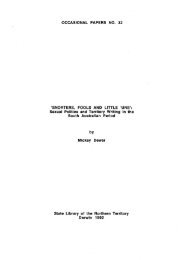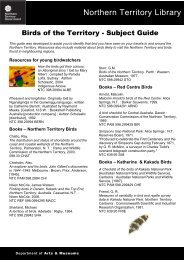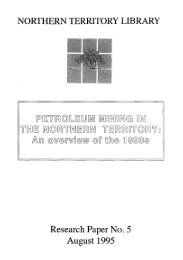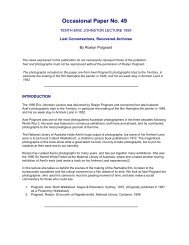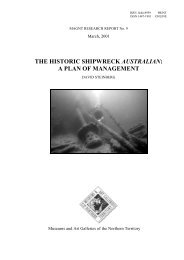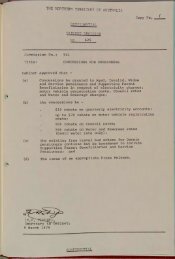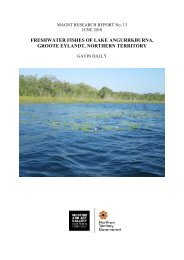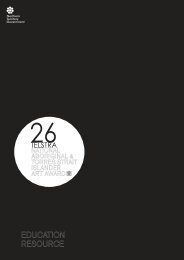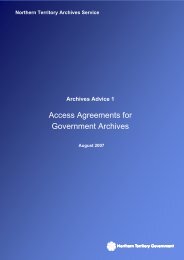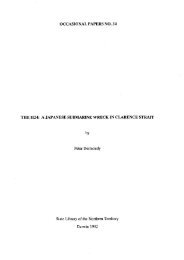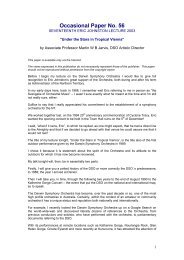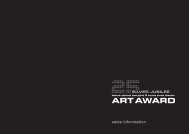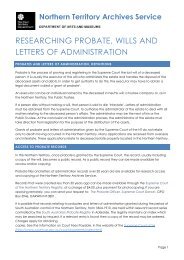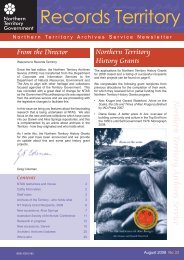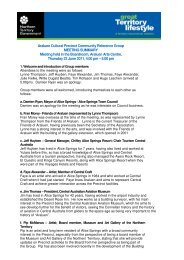Occasional Paper No. 55 - Department of Arts and Museums
Occasional Paper No. 55 - Department of Arts and Museums
Occasional Paper No. 55 - Department of Arts and Museums
You also want an ePaper? Increase the reach of your titles
YUMPU automatically turns print PDFs into web optimized ePapers that Google loves.
<strong>Occasional</strong> <strong>Paper</strong> <strong>No</strong>. <strong>55</strong><br />
SIXTEENTH ERIC JOHNSTON LECTURE 2001<br />
<strong>No</strong>where to somewhere<br />
By Terry Underwood<br />
Thank you Minister John Ah Kit for your generous introduction. Good evening Your Honour the<br />
Administrator, Mr John Anictomatis <strong>and</strong> Mrs Jeanette Anictomatis, distinguished guests, ladies <strong>and</strong><br />
gentlemen.<br />
Tonight’s occasion is a tremendous honour for me, for all the obvious reasons <strong>and</strong> also because I am one<br />
<strong>of</strong> many Territorians privileged to have enjoyed the friendship <strong>of</strong> Eric Johnston. The first <strong>of</strong> these series <strong>of</strong><br />
lectures named after Commodore Eric Johnston, the Territory’s then Administrator, was delivered in 1986<br />
by the man himself. His paper was entitled Operation Navy Help; Disaster Operations by the Royal<br />
Australian Navy, Post Cyclone Tracy.<br />
Eric Johnston was in a sense larger than life, a man <strong>of</strong> enormous enthusiasm <strong>and</strong> energy, a man <strong>of</strong> the<br />
people. How <strong>of</strong>ten on my infrequent trips to town would I cross paths with Eric as I tore up <strong>and</strong> down the<br />
Mall, endeavouring to do my Christmas shopping or complete my list <strong>of</strong> station stores compiled over<br />
many months. With his huge hug <strong>and</strong> smile, he’d block my way to enquire about my entire family by<br />
individual name, ask about the seasons, the markets <strong>and</strong> life in the bush. Eric Johnston really cared.<br />
As Patron <strong>of</strong> the Isolated Children’s <strong>and</strong> Parents’ Association, the Commodore attended Annual General<br />
Meeting dinners galore throughout the Territory. He followed with keen interest the challenges <strong>of</strong><br />
geographically isolated families grappling with distance education <strong>and</strong> numerous other issues.<br />
Also in 1986, Eric Johnston invited members <strong>of</strong> the <strong>No</strong>rthern Territory Cattlemen’s Association to a<br />
special dinner at Government House. It might have been intended as a warm up to his pledge to visit<br />
every pastoral property during his time in <strong>of</strong>fice. However, it also alerted the Administor that those <strong>of</strong> us<br />
who work hard "play harder". It was rumoured that we emptied the hallowed cellar that night <strong>and</strong> with my<br />
memories <strong>of</strong> a fabulous evening <strong>of</strong> merriment <strong>and</strong> meaning needing no enhancement, it is little wonder<br />
that we have not been invited back since.<br />
In May 1987, Eric Johnston <strong>of</strong>ficially opened the third Annual General Meeting <strong>of</strong> the <strong>No</strong>rthern Territory<br />
Cattlemen’s Association <strong>and</strong> I quote from his address:<br />
"My involvement with the pastoral industry in any form whatsoever did not commence until I took up my<br />
appointment in 1981 as Administrator <strong>of</strong> the <strong>No</strong>rthern Territory. It became very apparent to me that if over<br />
fifty per cent <strong>of</strong> the Territory I was purported to administer consisted <strong>of</strong> pastoral l<strong>and</strong> then I had better go<br />
<strong>and</strong> do some visiting.<br />
Thus, in the first half <strong>of</strong> 1981, some <strong>of</strong> you were confronted by an apparition wearing the all white <strong>of</strong> the<br />
club, full <strong>of</strong> ignorance <strong>and</strong> questions, the majority <strong>of</strong> which were, no doubt, stupid in the extreme.<br />
The white uniform soon was discarded as I quickly discovered two things – firstly, I would encounter bull<br />
dust, in all its forms, on each <strong>and</strong> every visit; <strong>and</strong> – RM Williams was not the current Welsh full back but<br />
the producer <strong>of</strong> the most comfortable <strong>and</strong> sensible clothing <strong>and</strong> footwear."<br />
Eric Johnston continued: "I believe my major contribution as far as you are concerned has been the<br />
uplifting <strong>of</strong> morale on various stations, particularly in the stock camps I have visited. For those <strong>of</strong> you who
come from interstate I should mention that my staff is principally female <strong>and</strong> without exception attractive.<br />
The sight <strong>of</strong> a lovely vice regal aide in a stock camp full <strong>of</strong> fuzzy faced ringers has a somewhat magical<br />
effect <strong>and</strong> my only surprise is that there have not been more accidents as each ringer endeavours to<br />
show-<strong>of</strong>f <strong>and</strong> impress my travelling companion." Then in addressing a broad range <strong>of</strong> issues on a more<br />
serious note, Eric referred to his unashamed confidence in the Alice Springs to Darwin Railway being on<br />
the immediate horizon with all its implications in the field <strong>of</strong> transport. I’m sure Eric will be smiling down on<br />
us now.<br />
As the organiser <strong>of</strong> functions too numerous to mention, I commissioned an impressive leather plaque <strong>of</strong><br />
appreciation to Commodore Eric Johnston on behalf <strong>of</strong> members <strong>of</strong> the <strong>No</strong>rthern Territory Cattlemen’s<br />
Association. Only after it was duly presented by our president <strong>of</strong> the day <strong>and</strong> graciously admired by its<br />
recipient, did I discover to my horror <strong>of</strong> horrors that I had made a spelling error with the Administrator’s<br />
surname. I had omitted the "t"! What to do With the assistance <strong>of</strong> a certain person in a certain position,<br />
the plaque was surreptitiously removed from its place on honour in Government House, <strong>and</strong> various other<br />
hangings rearranged until the original plaque was returned to its craftsman for correction <strong>and</strong> then<br />
whisked through the side door back to its original site. To this day I know not if His Honour knew.<br />
Eric Johnston was a staunch supporter throughout my personal journey, attending my various<br />
photographic exhibitions, <strong>and</strong> with his wife Joan, sharing our family birthday celebrations. His full-bellied<br />
laugh <strong>and</strong> twinkling eyes will never be forgotten. Therefore I do know that upon his passing in 1997, we<br />
all mourned the loss <strong>of</strong> a great statesman, humanitarian <strong>and</strong> friend whose contribution to the life <strong>of</strong> the<br />
<strong>No</strong>rthern Territory is indelible.<br />
Let the journey from <strong>No</strong>where to Somewhere begin…<br />
"Speed’s the thing," cries the world, <strong>and</strong> speeds on, gaining little but speed; <strong>and</strong> we bush-folk travel our<br />
60 miles <strong>and</strong> gain all that is worth gaining – except speed."<br />
So wrote Jeannie Gunn in 1908 in her much loved Australian classic We Of The Never Never. One <strong>of</strong> the<br />
first white women to penetrate the inhospitable north, she actually spent less than a year at the Elsey<br />
cattle station. In that brief time, Jeannie nevertheless forged passionate partnerships with her man, the<br />
l<strong>and</strong> <strong>and</strong> its people. The new bride from Melbourne wrote <strong>of</strong> (quote) "that elusive l<strong>and</strong> with an elusive<br />
name – a l<strong>and</strong> <strong>of</strong> dangers <strong>and</strong> hardships <strong>and</strong> privations yet loved as few l<strong>and</strong>s are loved – a l<strong>and</strong> that<br />
bewitches her people with strange spells <strong>and</strong> mysteries, until they call sweet bitter <strong>and</strong> bitter sweet.<br />
Called the Never Never, the Maluka used to say, because they who have lived in it <strong>and</strong> loved it, Never<br />
Never voluntarily leave it. Sadly enough, there are too many who Never Never do leave it. Others – the<br />
unfitted – will tell you that it is so called because they who succeed in getting out <strong>of</strong> it swear they will<br />
Never Never return to it. But we who have lived in it, <strong>and</strong> loved it, know that our hearts can Never Never<br />
rest away from it." (end quote)<br />
The same passions governed my autobiography entitled In The Middle Of <strong>No</strong>where published in 1998. I<br />
believe it is vital that in another ninety years, the bush or rural woman records her story the way it is at<br />
that time in our beloved <strong>No</strong>rthern Territory.<br />
Today, with the dawn <strong>of</strong> the new millennium, some things remain unchanged. We are the current bushfolk<br />
<strong>of</strong> the Never Never, the custodians <strong>of</strong> the l<strong>and</strong>, who chose to live <strong>and</strong> love <strong>and</strong> work in the heart <strong>of</strong><br />
Australia, because that is where we belong. We are committed.<br />
On the other h<strong>and</strong>, we know that those <strong>of</strong> us who have not embraced inevitable change have not<br />
survived. Rural Territorians <strong>and</strong> Australians have <strong>of</strong> necessity forged partnerships with each other, with<br />
Mother Earth, the environment <strong>and</strong> fellow traders. We have the most powerful connections <strong>and</strong><br />
partnerships with our l<strong>and</strong>, our livestock <strong>and</strong> our products. We have integrity.
Before I traverse the fascinating pathways <strong>of</strong> history <strong>and</strong> progress, it is time for reflection. The tyranny <strong>of</strong><br />
distance today takes on a new meaning. Several months ago, our helicopter mustering pilots, one <strong>of</strong><br />
whom was my son Michael, whilst mustering a remote paddock <strong>of</strong> <strong>55</strong>6 square kilometres, discovered a<br />
body hanging from a tree on our property. An apparent suicide, but the circumstances were most bizarre.<br />
A lonely death. We were sad, uneasy, <strong>and</strong> we slept fitfully.<br />
Exactly one week later, the dreadful Barrow Creek abduction <strong>and</strong> disappearance <strong>of</strong> Peter Falconio<br />
occurred, <strong>and</strong> we realised the Outback would never be safe again.<br />
On September 11th the universe changed for everyone. Our Prime Minister <strong>and</strong> Mrs Howard <strong>and</strong> son Tim<br />
were pr<strong>of</strong>oundly affected by the terrorists’ attacks, cancer <strong>of</strong> a hideous dimension, because they were in<br />
the United States at the time. But in effect we were all there – unable to comprehend, crying with broken<br />
hearts because humankind had been betrayed by its own.<br />
With further corporate collapses occurring <strong>and</strong> the worldwide war against terrorism underway, tough times<br />
multiply for us all, no matter who we are <strong>and</strong> where we live. In this unforseen time <strong>of</strong> tragedy <strong>and</strong><br />
uncertainty, it is up to each <strong>of</strong> us not just to function, but also to focus <strong>and</strong> lead, to uphold our reasons for<br />
existence, which are to nurture <strong>and</strong> care, to help <strong>and</strong> heal, <strong>and</strong> to love.<br />
From earliest memories, I was enchanted by the magic <strong>of</strong> words <strong>and</strong> the power <strong>of</strong> the pen. I devoured<br />
books with an insatiable appetite <strong>and</strong> <strong>of</strong>ten read in bed at night by torchlight beneath the eiderdown,<br />
because how could I possibly go to sleep without knowing what happened to The Famous Five or The<br />
Seven Little Australians<br />
Even as a young child, I had two dominant dreams: I wanted to marry a farmer <strong>and</strong> one day when I was a<br />
very old lady, I would write my autobiography. How blessed I am to have both fulfilled.<br />
The rest <strong>of</strong> the world can be forgiven for perceiving all Australians as residents <strong>of</strong> the l<strong>and</strong> they call "down<br />
under", but I come from a l<strong>and</strong> within that l<strong>and</strong>, a country where only the tireless <strong>and</strong> the fearless survive.<br />
The intensifying build up to the Wet Season heats the blood in one’s veins almost to boiling point, until<br />
gigantic clouds form to bring life-saving rains, rains that transform desolate l<strong>and</strong>scapes into nutritious<br />
grasses.<br />
A l<strong>and</strong> <strong>of</strong> never ending horizons, never ending until the earth <strong>and</strong> sky meet; a l<strong>and</strong> where the intimacy<br />
between the vibrant innovative inhabitants defies the distance that separates us.<br />
Where is this magical place It is the Outback, my home, our country.<br />
How then did I earn the privilege to call it home<br />
My journey commenced in 1963 at St Vincent’s Hospital in Sydney, where as an 18 year old, second year<br />
trainee nurse, I commenced night duty in Ward 3. Having read the records <strong>and</strong> reports, I introduced<br />
myself to the patients <strong>and</strong> asked that they help me with their names. The patient directly before me led<br />
the response. His smile was big enough to light the universe. He lay in an extended plaster bed, which<br />
engulfed his body but obviously not his spirit, because he chuckled <strong>and</strong> said: "I’m big bad John."<br />
Over the ensuing three months, I learned much about the strapping young stockman from way up north<br />
<strong>and</strong> was constantly amazed by his commitment to a way <strong>of</strong> life that was totally foreign to me. He talked<br />
about hobbles, Condamine bells <strong>and</strong> mustering big mobs <strong>of</strong> cattle across vast tracts <strong>of</strong> l<strong>and</strong>. The size <strong>of</strong><br />
his cattle station home, 2400 square miles, was quite incomprehensible <strong>and</strong> when I suggested he must<br />
have a diversity <strong>of</strong> skills, he winked <strong>and</strong> replied: "Well, I can ride a bit <strong>and</strong> fight a bit <strong>and</strong> skite a bit."<br />
I had never met anyone quite like him. He told me that he was a true blue Aussie as his ancestor had<br />
arrived on the third fleet. His family founder, James Underwood, was a convict sentenced to seven years
in the penal colony for stealing goods to the value <strong>of</strong> thirty-nine shillings. Even more astonishing was his<br />
news that the nearby Sydney suburb <strong>of</strong> Paddington was named after Paddington House, the English<br />
home <strong>of</strong> the same James Underwood. Apparently Underwood Street <strong>and</strong> Underwood Lane in the same<br />
suburb were also named after the Underwood family founder. A few nights later, John explained that<br />
following the arrival <strong>of</strong> Joseph Underwood <strong>and</strong> the emancipation <strong>of</strong> James, the brothers went on to invest<br />
in wide tracts <strong>of</strong> farming l<strong>and</strong>. Their businesses included boat building, shipping coal from Newcastle,<br />
sealing, the establishment <strong>of</strong> the Sydney Distillery <strong>and</strong> even a primitive banking enterprise which issued<br />
its own currency. This impressive family history gave "entrepreneurs" a whole new meaning.<br />
John also told me about his mates in the Territory, they were all h<strong>and</strong>y ringers he explained to one who<br />
was none the wiser. At annual bush race meetings, they concertinaed friendships into a brief few days.<br />
To celebrate the luxury <strong>of</strong> being together, they socialised in the best way they knew – a few yarns over a<br />
few drinks. When John mentioned that he was a top member <strong>of</strong> a pick up team, I raised both eyebrows.<br />
He hastily added: "as in rodeos <strong>and</strong> camp drafts <strong>of</strong> course." To me R<strong>and</strong>wick sounded a lot more<br />
civilised, but possibly a lot less fun.<br />
One morning as I was going <strong>of</strong>f duty, Ge<strong>of</strong>f, the young quadriplegic patient in the next bed, called me<br />
over <strong>and</strong> whispered: "He’s going to marry you, you know. Told me so on your first night here." I smiled.<br />
This was no cause for excessive excitement or loss <strong>of</strong> sleep. We nurses were always aware <strong>of</strong> the<br />
emotional fragility <strong>and</strong> gratitude <strong>of</strong> our patients <strong>and</strong> the various ways these feelings surfaced.<br />
However I was surprised when five days after big John left Sydney, I received a postcard: "I think you’re a<br />
bit <strong>of</strong> a darling. Love John."<br />
And so began our correspondence. As weeks turned into months, intermittent letters became regular <strong>and</strong><br />
the dears changed to darlings. After two whole years, I felt it was time to reassess our friendship. John<br />
reminded me he’d been to Sydney <strong>and</strong> insisted that I head north.<br />
The reluctance <strong>of</strong> my parents to endorse a visit to an ex-patient who was also a non-Catholic living in one<br />
<strong>of</strong> the most remote parts <strong>of</strong> the <strong>No</strong>rthern Territory, Australia, the world, was hardly surprising. After<br />
lengthy discussions, an unexpected compromise was reached – my younger brother Johnny, who had<br />
just completed his Leaving Certificate, would accompany me as my chaperone. Imagine how he felt!<br />
We had never been far from home <strong>and</strong> all <strong>of</strong> a sudden brother <strong>and</strong> sister were airborne, viewing with<br />
reverence a whole new perspective <strong>of</strong> the incredible vastness <strong>of</strong> the inl<strong>and</strong>. I remember so vividly that<br />
hellishly hot January <strong>and</strong> when we l<strong>and</strong>ed in Alice Springs, I wondered why the tarmac hadn’t melted.<br />
The incredible fiery hues <strong>of</strong> the Red Centre pulsed hotly through the haze <strong>of</strong> heat <strong>and</strong> when we booked<br />
into our overnight accommodation, Sydney seemed grey <strong>and</strong> far removed.<br />
Next morning I dressed carefully for the flight to Inverway Station. Wearing my newly purchased white<br />
crimplene suit, with matching white shoes, white stockings, white h<strong>and</strong> bag <strong>and</strong> white lip stick, I was as<br />
ready as I ever could be. Prepared Never!<br />
We were the only passengers aboard the Connellan mail plane. This historic airline was named after its<br />
founder, Edward John Connellan AO CBE. A great visionary, pioneer <strong>and</strong> pastoralist were just some <strong>of</strong><br />
the attributes <strong>of</strong> this unique Territorian. A passionate advocate for the Outback <strong>and</strong> the <strong>No</strong>rthern Territory,<br />
Eddie Connellan’s mail runs <strong>and</strong> medical evacuation services had revolutionised the lives <strong>of</strong> station<br />
people <strong>and</strong> those in remote communities.<br />
We l<strong>and</strong>ed at Yuendumu, before bumping through lumpy skies across the Tanami Desert to Hooker<br />
Creek, now called Lajamanu. There the Aborigines stared in astonishment at the tourist who looked more<br />
like a ghost. Little black fingers clutched <strong>and</strong> plucked at my stockings. I walked faster, but there was<br />
nowhere to go.
Having finally finally l<strong>and</strong>ed at John’s family property airstrip, we were confronted by a welcoming<br />
committee consisting <strong>of</strong> a giant calico motionless windsock. Dear God, I thought, there’s no one home. In<br />
the city, everything happens instantly. With a sense <strong>of</strong> concern, I squinted impatiently in every direction<br />
<strong>and</strong> eventually made out in the distance the shape <strong>of</strong> a vehicle within a huge cloud <strong>of</strong> billowing dust. As it<br />
slowed on approach, so the red particles <strong>of</strong> dust gravitated towards me with determination. It was as<br />
though someone had upturned a gigantic saltshaker crammed with red dust all over me. John’s huge<br />
smile <strong>of</strong> welcome was the only visible white. Suddenly it was as though I was back in an air pocket, only<br />
this time it was my heart that was in free fall.<br />
Impressions did however extend beyond the man, the man who was no longer the patient, but the one<br />
who understood <strong>and</strong> worked his l<strong>and</strong>. How overwhelming was the absolute desolation, impenetrable<br />
vastness, blistering heat, ferocious flies, relentless glare <strong>and</strong> the drought, the drought, the drought. How<br />
overpowering was the tenacity <strong>of</strong> those who carved out their existence in that wilderness, always with<br />
indomitable spirit.<br />
On our second morning, John announced a surprise for the two Sydney siders, an outing, he said.<br />
Minutes later, the battered sturdy Willy’s jeep lurched across the drought stricken l<strong>and</strong>. It followed a track<br />
visible only to the concerned yet somehow contented stockman anchored behind the vibrating steering<br />
wheel.<br />
Hours later, we shuddered to a halt <strong>and</strong> feeling thoroughly shaken stepped down beside a parched creek<br />
bed.<br />
Then with a broad grin <strong>of</strong> excitement, he extended huge arms like the giant blades <strong>of</strong> a windmill <strong>and</strong><br />
stated: "See that county in front now That’s the headwaters <strong>of</strong> the Victoria River. When I get married, I’m<br />
going to build my own place there, my own cattle station."<br />
I saw only never ending horizons devoid <strong>of</strong> man-made interruptions.<br />
"Poor bloody woman," I muttered.<br />
We devoured corned beef slabs trapped between thick freshly baked chunks <strong>of</strong> bread in silent<br />
contemplation.<br />
"Cup <strong>of</strong> tea" the strapping young stockman asked.<br />
He tossed the tealeaves into the bubbling water, picked up the boiling billy with his well-worn hat, then<br />
swung it around vigorously.<br />
I repeated with greater conviction: "Poor bloody woman."<br />
Later that week, our host declared that he planned to visit his relations in the Kimberley to help them shift<br />
some cattle. When he promised us an entertaining trip, Johnny <strong>and</strong> I looked at each other <strong>and</strong> wondered<br />
just what lay ahead.<br />
Despite the crippling drought, we crossed through strangely beautiful country into Western Australia.<br />
Onwards we drove through the tortuous hills preceding the former old gold mining town <strong>of</strong> Halls Creek,<br />
then through new Halls Creek <strong>and</strong> beyond, until many miles later we arrived, covered <strong>and</strong> almost<br />
smothered in red dust, at Springvale Station. It was the home <strong>of</strong> John’s Auntie Olive <strong>and</strong> Uncle Tom<br />
Quilty, pioneer cattleman <strong>and</strong> poet <strong>of</strong> renown. John had already explained that it was Uncle Tom who, in<br />
1950, had <strong>of</strong>fered the Underwoods a new life in northern Australia, far removed from their Queensl<strong>and</strong><br />
beginnings.
Apparently it was Tom’s brother Paddy who first took up Kimberley country in 1917, when he bought<br />
Bedford Downs in partnership with his father <strong>and</strong> brothers Tom <strong>and</strong> Reg. Having fallen in love with the<br />
beautiful horses that Captain Bradshaw had imported from New Zeal<strong>and</strong>, Paddy then purchased<br />
Bradshaw <strong>and</strong> Coolibah Stations in the <strong>No</strong>rthern Territory. Following Paddy’s tragic death from<br />
appendicitis, these two properties were left to Tom. When Tom <strong>and</strong> Olive moved to Coolibah <strong>and</strong><br />
Bradshaw, it was said to be the largest tract <strong>of</strong> l<strong>and</strong> ever held by a single operator in Australia.<br />
The Quiltys subsequently sold these two Territory properties to purchase Springvale, three hundred<br />
thous<strong>and</strong> plus acres in size. Tom’s sons Rod, Basil <strong>and</strong> Mick owned cattle stations called Lansdowne,<br />
Bedford Downs <strong>and</strong> Ruby Plains respectively. Including Inverway Station, the Underwood <strong>and</strong> Quilty<br />
families ran a lot <strong>of</strong> country, about four <strong>and</strong> a half million acres in fact. This family history that seemed<br />
impressive in Ward 3, was by now completely captivating.<br />
History <strong>of</strong> a different kind would be created the following year <strong>of</strong> 1966. To ensure safe delivery <strong>of</strong> the<br />
1500 bullocks he sold to Australian icon RM Williams, Uncle Tom Quilty personally drove them to their<br />
Queensl<strong>and</strong> destination. Upon arrival Tom, over a few snorts <strong>of</strong> rum, reminded his mate Reg that to ride<br />
one hundred miles was simply the order <strong>of</strong> the day, whether it be to the nearest water or to deliver a<br />
message. To enshrine against change <strong>and</strong> to ensure that the endurance <strong>of</strong> the stockman be<br />
immortalised, they established the Tom Quilty Endurance Ride. Sponsored by Tom to the tune <strong>of</strong> $20,000<br />
the trophy contains more gold than the Melbourne Cup. Today the Tom Quilty Gold Cup continues to<br />
attract the toughest riders <strong>and</strong> sturdiest mounts in the country.<br />
All too quickly it was time for my brother <strong>and</strong> me to return to the familiarity <strong>of</strong> Sydney, where bustling<br />
layers <strong>of</strong> people strained <strong>and</strong> streamed through the claustrophobic concrete jungle. Family <strong>and</strong> friends<br />
were anxious for our impressions, which varied enormously.<br />
And so it was that hundreds more letters over the following three years were exchanged before the<br />
<strong>No</strong>rthern Territory cattleman <strong>and</strong> his city nurse celebrated their engagement at the Kimberley Hotel, Halls<br />
Creek. Six months later, we were married at St Mary’s Cathedral in Sydney. Both cultures got a<br />
"Guernsey". Then in a red Bedford truck loaded with six tea chests <strong>of</strong> wedding presents, we drove for<br />
days <strong>and</strong> days <strong>and</strong> days to our new home – a bough shed on the banks <strong>of</strong> a dry creek bed.<br />
How could there have been any signposts for the new bride There wasn’t a coil <strong>of</strong> wire let alone a fence,<br />
no building, no herd <strong>of</strong> cattle. However, knowing that our love would make all things possible, I was<br />
undeterred by the challenges <strong>of</strong> building <strong>and</strong> developing from scratch, our own cattle station in the middle<br />
<strong>of</strong> nowhere, as indeed it was.<br />
But how could I, how can any <strong>of</strong> us see around corners <strong>and</strong> anticipate heartaches <strong>and</strong> hardships,<br />
victories <strong>and</strong> joys There are no words to describe our anguish <strong>and</strong> grief when we lost our first-born son<br />
Martin to leukaemia when he was just nine months old. Yet somehow, somehow as other beautiful<br />
babies, school books, fence lines <strong>and</strong> paddocks merged, I managed to find my place in that new world –<br />
ever mindful <strong>of</strong> the words <strong>of</strong> pioneer Patrick Durack: "Cattle Kings ye call us Then we are Kings in Grass<br />
Castles that may be blown away upon a puff <strong>of</strong> wind."<br />
Our new place sprawled the headwaters <strong>of</strong> the historic Victoria River which me<strong>and</strong>ers five hundred miles<br />
to the Timor Sea, the river named by Lieutenant John Stokes in 1839 after her most gracious Majesty, the<br />
Queen. Every year the blackfellas in John’s stock camp would ask: "When we bin musta that ribren<br />
country next time, Muluga" Whitefellas also referred to it as the river end <strong>of</strong> Inverway, even though it was<br />
the river beginning. When I understood the origin <strong>of</strong> the name Riveren, I gave up trying to add a "d", being<br />
the stickler for grammar that I am. Riveren was perfect.<br />
The gradual development <strong>of</strong> "further out" revolved around musters. I never tired <strong>of</strong> watching the<br />
preparations as John organised the packing <strong>of</strong> everyone’s gear, cooking utensils <strong>and</strong> food rations into<br />
pairs <strong>of</strong> pack bags. He selected packsaddles for packhorses <strong>and</strong> mules, with small packsaddles for mules
<strong>and</strong> larger ones for the horses. Des Leahy was the horse tailer who took charge <strong>of</strong> these reliable beasts<br />
<strong>of</strong> burden. With his plant <strong>of</strong> at least one hundred horses, Des Leahy <strong>and</strong> another blackfella rode ahead to<br />
cross unchartered country they seemed to know like the back <strong>of</strong> their h<strong>and</strong>s. John followed with twenty<br />
Aboriginal stockmen <strong>and</strong> old Duncan, the ingenious stock camp cook. Their excitement <strong>and</strong> sense <strong>of</strong><br />
freedom were evident as they welcomed another opportunity to outwit the mob. I sensed their powerful<br />
bond, an invisible cord <strong>of</strong> respect <strong>and</strong> instinct <strong>and</strong> coordination between each other <strong>and</strong> between man<br />
<strong>and</strong> beast.<br />
They worked long hard days, away from the homestead, or bough shed in our case, for weeks on end,<br />
mustering unfathomable distances <strong>of</strong> unfenced l<strong>and</strong>. At day’s end the Aborigines squatted in the semi<br />
darkness <strong>and</strong> muttered in their own dialect, whilst John’s sole companion was the crackly voice from a<br />
portable wireless, whose aerial was optimistically flung over the highest bush. On a good night he’d<br />
receive the cricket score or news from radio Australia. Bread, beef <strong>and</strong> billy tea were the staple stock<br />
camp diet. These were the days that all too quickly have become history.<br />
While mustering boundary areas, stockmen from the neighbouring station attended the muster, to give a<br />
h<strong>and</strong> before taking their cattle home. One such friend for life is Tony Clark, seen here in the Wave Hill<br />
stock camp at Catfish Waterhole in 1960, typical <strong>of</strong> the way it was.<br />
John had previously identified the number <strong>of</strong> holdings owned by the British family, the Vesteys, namely<br />
Sir Edmund <strong>and</strong> Lord Vestey. Since the turn <strong>of</strong> the century, they had purchased almost an unbroken<br />
chain <strong>of</strong> cattle stations from Flora Valley in Western Australia right across the <strong>No</strong>rthern Territory to the<br />
Katherine area. Apparently the original inhabitants <strong>of</strong> Inverway, the Farquharson brothers, had sold to the<br />
Leahy brothers on the underst<strong>and</strong>ing that the property never be sold to Vesteys. Hence Inverway became<br />
known as "in the way".<br />
In the mid 1960’s, Vincent Lingiari led the walk <strong>of</strong>f from Wave Hill station to nearby Wattie Creek. The<br />
strike by the Aborigines for equal pay continued on <strong>and</strong> <strong>of</strong>f for years. It changed the composition <strong>of</strong> stock<br />
camps on many cattle stations <strong>and</strong> was the beginning <strong>of</strong> the L<strong>and</strong> Rights Movement. Eventually the "sit<br />
down" area was surrendered by Vesteys <strong>and</strong> granted to the Gurindiji people. Most <strong>of</strong> us recall the<br />
poignant television image <strong>of</strong> Prime Minister Gough Whitlam trickling soil through the fingers <strong>of</strong> a dignified<br />
Vincent Lingiari, proudly representing his people.<br />
There seems to be a perception by some that Vesteys were unfair employers. There also seems to be<br />
limited underst<strong>and</strong>ing about the contentment <strong>of</strong> the extended Aboriginal families who were completely<br />
supported on the stations where the stockmen worked. Walkabout was the ultimate luxury.<br />
However the winds <strong>of</strong> change were inevitable as our indigenous people sensed the need for selfdetermination.<br />
The strike could have happened anywhere. In their ongoing pursuit <strong>of</strong> progress, we must<br />
support these people to identify their needs <strong>and</strong> make the necessary decisions for their preferred future.<br />
As overseer <strong>of</strong> Wave Hill Station way back then, Tony Clark told me the story <strong>of</strong> how he <strong>and</strong> another wellknown<br />
identity <strong>of</strong> the day, Ralph Hayes, discovered a mob <strong>of</strong> perishing cattle. Having no men on h<strong>and</strong> to<br />
relocate them, they went to the blackfella walk out mob at Wattie Creek. They greeted Vincent Lingiari,<br />
who had been in Ralph’s stock camp, in the usual affectionate manner: "Goodaye Eni Mulloo". When he<br />
heard about their troubles, Vincent told his sons Victor, Peter <strong>and</strong> Harry <strong>and</strong> ‘nuther fella Algie to go help<br />
Ralp <strong>and</strong> Dorney shift em cattle.’ A deep respect <strong>and</strong> friendship existed then, <strong>and</strong> still exists today,<br />
between these men <strong>and</strong> their families who worked cattle <strong>and</strong> country side by side.<br />
The significant involvement <strong>and</strong> investments <strong>of</strong> the Vestey empire, including meatworks <strong>and</strong> the live cattle<br />
trade, in northern Australia were unquestionable. The last <strong>of</strong> the Vestey properties were sold in 1992.<br />
Today there are numerous Aboriginal owned pastoral properties purchased with Federal monies <strong>and</strong><br />
mining royalties <strong>and</strong> vested as Inalienable Freehold. The successful management by Aborigines <strong>of</strong> these<br />
properties is vital to the strength <strong>of</strong> the cattle industry in the <strong>No</strong>rthern Territory.
Inevitable <strong>and</strong> dramatic changes in cattle management were also being adopted towards the late 60’s<br />
<strong>and</strong> early 70’s. Gary Mextead, a pioneer <strong>of</strong> aerial mustering with fixed wing aircraft, arrived unexpectedly<br />
at Riveren to give John a demonstration flight. John had not long since obtained his private pilot’s licence<br />
<strong>and</strong> was instantly impressed with this new effectiveness <strong>of</strong> controlling cattle from the sky. Helicopter<br />
mustering quickly followed with John Weymouth’s Heli-Muster Operation at Victoria River Downs<br />
revolutionising mustering operations far <strong>and</strong> wide. My husb<strong>and</strong> became one <strong>of</strong> those original "aerial<br />
cowboys", whose flying skills combined with knowledge <strong>of</strong> cattle <strong>and</strong> the l<strong>and</strong> justified the additional<br />
mustering costs.<br />
However, while John was away mustering, I always worried about my babies. What would happen to<br />
them if something happened to me Consequently they learned to speak on the two way radio <strong>and</strong><br />
change a tyre almost before they could walk, because it was all about survival, it is still all about survival.<br />
From infancy our little ones contributed to the development <strong>of</strong> our cattle station home situated 1000<br />
kilometres from Darwin, or 600 kilometres south west <strong>of</strong> Katherine. Chubby little fingers helped plant trees<br />
<strong>and</strong> lawn, <strong>and</strong> keen eyes followed tracks <strong>and</strong> weather patterns. Their childhood was in a way an<br />
apprenticeship as they reared poddy calves <strong>and</strong> h<strong>and</strong>led responsibility with a maturity well beyond their<br />
years – <strong>and</strong> always with much love <strong>and</strong> laughter.<br />
Our children seldom had interaction with any other youngsters in our neighbourhood that extended for<br />
hundreds <strong>of</strong> kilometres. Playmates were cuddly crawling puppies, leaping grasshoppers, assorted moths,<br />
beautiful butterflies <strong>and</strong> all things <strong>of</strong> the earth. Their calves <strong>and</strong> other pets <strong>of</strong>ten underwent identity crises,<br />
as the much-loved animals thought they belonged to the human family.<br />
But even in the bush, or particularly in the bush, formal education is necessary <strong>and</strong> so it was with a<br />
degree <strong>of</strong> trepidation that I converted a section <strong>of</strong> our sleep out ver<strong>and</strong>ah into a schoolroom. Our<br />
correspondence lessons came from the biggest classroom in the world, Katherine School <strong>of</strong> the Air, four<br />
times the size <strong>of</strong> the United Kingdom. Originally a branch <strong>of</strong> the South Australian Correspondence<br />
School, it was the first School <strong>of</strong> the Air in Australia to operate independently <strong>of</strong> the Royal Flying Doctor<br />
Service or any other network.<br />
The mother teacher conflict was inevitable during our eighteen years in our home schoolroom. It was up<br />
to each <strong>of</strong> us to make it work. Four hungry impressionable minds, four youngsters leaping out <strong>of</strong> their<br />
skins with energy <strong>and</strong> intelligence. One morning I felt a little extra discipline was necessary <strong>and</strong><br />
announced to my two sons <strong>and</strong> daughters that they should march from the breakfast table out to school.<br />
"What’s march" they asked <strong>and</strong> so I showed them how to march. Despite the need for flexibility, there<br />
were rules <strong>and</strong> more rules, all kinds <strong>of</strong> rules. There were to be no nouns without preceding adjectives <strong>and</strong><br />
no sentence should ever ever end with a preposition. One evening, feeling particularly weary, I selected a<br />
book that was no-one’s favourite for their bedtime story. One inimitable son asked: "Mum, why did you<br />
bring the book I didn’t want to be read to out <strong>of</strong> up for" Did you count the number <strong>of</strong> prepositions<br />
As the correspondence Social Studies Sets or lesson books concentrated on South Australia, we<br />
substituted more relevant lessons. Our children loved learning about home – a treasure trove <strong>of</strong> history<br />
<strong>and</strong> adventure. Amongst their most admired heroes were the three pioneering Farquharson brothers,<br />
Archie, Harry <strong>and</strong> Hughie, pictured here with an unknown mate. They were nephews <strong>of</strong> the legendary<br />
explorer <strong>and</strong> Boss Drover, Nat Buchanan, who had founded Wave Hill Station in 1883. It was in 1894 that<br />
the Farquharsons took up Inverway Station. How <strong>of</strong>ten we read in Tom Cole’s book Hell West <strong>and</strong><br />
Crooked how the Farquharson brothers drove 1000 store bullocks, four days without water, 110 miles<br />
across the infamous Muranji Track. It was in the 1930’s when there were no bores along stock routes.<br />
(Quote) "That awful lancewood <strong>and</strong> bulwaddy, <strong>and</strong> 1000 thirsty bullocks walking through the night, a hair<br />
breadth from disaster. As they rode they talked to the bullocks as only a cattleman can. They talked to<br />
their horses, too, <strong>and</strong> cursed the scrub <strong>and</strong> the dark <strong>and</strong> the failing waterholes, <strong>and</strong> they prayed: perhaps<br />
there was a God somewhere.
Daylight came <strong>and</strong> they were still in that woeful scrub. The cattle were walking determinedly, no longer<br />
snatching at tussocks <strong>of</strong> grass. Thirst was beginning to show. Neither was there any lowing, the bullock’s<br />
way <strong>of</strong> talking to each other; they walked silently with nearly a mile between the leaders <strong>and</strong> the tail.<br />
<strong>No</strong>w they had to keep the cattle walking. As the sun rose higher they slowed the cattle, but they had to<br />
keep them moving. The day passed all too slowly <strong>and</strong> dusk crept on them…<br />
It was now two miles from the tail-enders to the leaders; the only sound was the padding <strong>of</strong> hooves <strong>and</strong> a<br />
low moaning noise. Cattle sweat through their tongues, but there was no saliva coming from these<br />
beast’s mouths; nothing but a muted moan.<br />
Hour after hour the bullocks plodded on with some kind <strong>of</strong> indefinable faith in the men who were keeping<br />
them in the direction <strong>of</strong> water. In the late afternoon <strong>of</strong> the fifth day the leaders smelt the Newcastle Waters<br />
lagoon. The bullocks broke into a trot…..The poor brutes plunged in <strong>and</strong> drank <strong>and</strong> drank <strong>and</strong><br />
drank….Four hours later, the last bullock staggered into that waterhole. Each beast had arrived; they<br />
hadn’t lost one." (end <strong>of</strong> quote)<br />
A heart stopping story our children still cherish, a story about stockmanship <strong>and</strong> cattle care at its best.<br />
There can be no adventure story more gripping <strong>and</strong> no achievement more awesome.<br />
Over the school <strong>of</strong> the air radio, I organised <strong>and</strong> produced Jack Hibberd’s wedding satire play "Dimboola",<br />
with on air rehearsals becoming almost impossible as the Wet Season static increasingly drowned out our<br />
voices. From my location near the West Australian border, I tried to hear Astrid, the flower girl, sing <strong>and</strong><br />
tap dance "Rubber Duckie" over her radio 300 kilometres away to my north east. A further 300 kilometres<br />
east, the schoolteacher in town played the piano accompaniment. Spread right across the Top End, my<br />
thespians, some <strong>of</strong> whom had never met, could not see each other, barely hear each other, continued to<br />
faithfully practice their lines over the radio, even though they were mostly just talking to themselves.<br />
Ultimately at the end <strong>of</strong> six months, we performed live in Katherine for three consecutive nights. That<br />
remarkable production proved a resounding victory over distance <strong>and</strong> isolation <strong>and</strong> restrictive<br />
communications. When the ABC television programme A Big Country captured the story, Katherine<br />
School <strong>of</strong> the Air was truly placed on the national stage <strong>and</strong> the fund raising account was overflowing.<br />
However thespian fever was unquenchable. The following year I organised a mammoth Territory Talent<br />
Quest, where the most unlikely people were cajoled into performing outrageous roles. John Underwood’s<br />
rendition <strong>of</strong> Jeanette McDonald miming Wunderbah with a Nelson Eddie look alike, proved conclusively<br />
the versatility <strong>and</strong> generous spirit <strong>of</strong> toughened battlers who work the l<strong>and</strong>.<br />
In 1990, we were still performing at the Katherine Hotel Motel, or Kirbys, which had become by then the<br />
un<strong>of</strong>ficial Opera House <strong>of</strong> the <strong>No</strong>rthern Territory. Within the heart <strong>of</strong> Sherwood Forest, Robin Would If<br />
Robin Could raged for three nights robbing from the rich <strong>and</strong> the poor for the joint fund raising account <strong>of</strong><br />
Katherine School <strong>of</strong> the Air <strong>and</strong> the Isolated Children’s <strong>and</strong> Parents’ Association.<br />
To celebrate the Golden Anniversary <strong>of</strong> the Brahman breed in Australia, I organised a gala dinner called<br />
The Brahman Bash at the Diamond Beach Hotel Casino in 1994. The highlight was the auction <strong>of</strong><br />
Newcastle Waters Buster, a two year old, 750 kilogram grey Brahman bull, donated from Mr Kerry<br />
Packer’s owned Newcastle Waters Station. Mrs Ann Chang was present to receive the auction proceeds<br />
on behalf <strong>of</strong> The Victor Chang Cardiac Research Institute in Sydney. I had known Victor Chang at St<br />
Vincent’s Hospital <strong>and</strong> this new most worthy cause linked the bush <strong>and</strong> the big smoke in a powerful way.<br />
We have demonstrated over <strong>and</strong> over again that isolation is not a deterrent. Everything is possible.<br />
Various diseases have threatened the cattle industry over the years. Red Water <strong>and</strong> Pleuro- Pneumonia<br />
ravaged large numbers <strong>of</strong> cattle in the droving days. The impact <strong>of</strong> those particular diseases influenced<br />
directly the birth <strong>of</strong> the road train movement. The Murranji track, also known as the Drovers’ Ghost Track,
was still the main stock route until the 1960’s when road transport took over <strong>and</strong> it became a beef road.<br />
My arrival as a new bride in the remote outback coincided with the end <strong>of</strong> the droving days <strong>and</strong> the end <strong>of</strong><br />
an era in the <strong>No</strong>rthern Territory.<br />
The transport industry was developed by one <strong>of</strong> John’s best mates, <strong>No</strong>el Buntine. <strong>No</strong>el, a pioneer <strong>of</strong> great<br />
vision <strong>and</strong> determination, contributed enormously to the development <strong>of</strong> road trains <strong>and</strong> beef roads. As a<br />
long term member <strong>and</strong> chairman <strong>of</strong> the Pastoral L<strong>and</strong> Board, he batted for us on another level. This body<br />
was superseded in 1992 by the <strong>No</strong>rthern Territory Pastoral L<strong>and</strong> Board, <strong>of</strong> which <strong>No</strong>el became inaugural<br />
Chairman. He <strong>and</strong> John shared another passion – horse racing. They spent years <strong>and</strong> dollars selecting<br />
<strong>and</strong> breeding the best bloodlines <strong>and</strong> contributed to our important racing industry in countless ways.<br />
When I first met John, he was President <strong>of</strong> the Kimberley Goldfields Amateur Jockey Club, the historic<br />
name for the Halls Creek Race Club. <strong>No</strong>el held executive positions on the Alice Springs <strong>and</strong> Darwin Turf<br />
Clubs <strong>and</strong> was known as the father <strong>of</strong> the Katherine Turf Club. It must be remembered that for decades,<br />
the social <strong>and</strong> cultural fabric <strong>of</strong> the bush revolved around bush race meetings, where station people<br />
celebrated their annual outings <strong>and</strong> get togethers, where youngsters rode ponies in gymkhanas <strong>and</strong> one<br />
<strong>and</strong> all competed in camp drafts <strong>and</strong> rodeos.<br />
These race meetings were more than a hobby or sideline. Station people bred their own horses with<br />
knowledge <strong>and</strong> planning. Although the competition was friendly enough, no one raced to come second. I<br />
was astounded at the detailed preparation for the race ball, where women without exception wore<br />
specially made gowns <strong>and</strong> three quarter length satin gloves. There was always a flurry <strong>and</strong> a scramble<br />
before the Belle <strong>of</strong> the Ball dance loomed. It seemed there was little interest in second placings in these<br />
stakes as well. When John’s horse Willie Win won, I was presented with a much envied race trophy – a<br />
gas iron <strong>and</strong> collapsible ironing board. In combination with my kerosene fridge <strong>and</strong> 32-volt mix master, my<br />
domestic progress was breathtaking.<br />
Following <strong>No</strong>el Buntine’s sudden death in 1994, a section <strong>of</strong> the Buchanan Highway was renamed the<br />
Buntine Highway. A twenty-three tonne granite boulder with an inlaid bronze plaque featuring an inscribed<br />
B-model road train now marks the corner <strong>of</strong> the Victoria Highway <strong>and</strong> the Old Delamere Road to Top<br />
Springs. With the crossing <strong>of</strong> the Buchanan <strong>and</strong> Buntine Highways at Top Springs, Boss Drover <strong>and</strong><br />
Road train Pioneer will be remembered for all time.<br />
From our primitive beginnings at Riveren, we planned our herd for this harsh environment by infusing Bos<br />
Indicus into our nucleus herd <strong>of</strong> Shorthorn cattle. Brahman cattle, Australia’s Number One tropical breed,<br />
are tick, parasite <strong>and</strong> heat resistant. With ideal temperaments, Brahmans are also intelligent, inquisitive<br />
<strong>and</strong> low maintenance creatures. In those early years our turn <strong>of</strong>f cattle, which were four to five year old fat<br />
bullocks, went predominantly to the meatworks in Katherine or Wyndham. We were unaware then just<br />
how well poised we eventually would be to meet the future dem<strong>and</strong>s <strong>of</strong> the Live Cattle Export Markets.<br />
Brahmans on boats to overseas destinations would prove the salvation <strong>of</strong> the northern cattle families.<br />
Aerial mustering became an imperative factor in the Brucellosis <strong>and</strong> Tuberculosis Eradication<br />
Programme. Pastoralists were all required to regularly muster <strong>and</strong> test cattle until eventually the status <strong>of</strong><br />
the herd <strong>and</strong> property reached the required level <strong>of</strong> "confirmed free" for two consecutive tests.<br />
Unmusterable cattle were destroyed <strong>of</strong> necessity <strong>and</strong> the outcome was ultimately a more manageable<br />
herd. However, it was not until 1992 that the <strong>No</strong>rthern Territory was declared Tuberculosis free under the<br />
national programme. Australia was already Brucellosis free. It was a great milestone for industry with the<br />
erection <strong>of</strong> new fences <strong>and</strong> the adoption <strong>of</strong> a new accountability. The significance <strong>of</strong> a disease free herd<br />
has never been more paramount than right now, with a strong <strong>and</strong> diverse international dem<strong>and</strong> for our<br />
beef.<br />
I love where I live. This ancient l<strong>and</strong> that has claimed us is stunningly beautiful, totally dem<strong>and</strong>ing, but<br />
also treacherous <strong>and</strong> unforgiving. The Aboriginal families who lived <strong>and</strong> worked beside us demonstrated<br />
their unique br<strong>and</strong> <strong>of</strong> loyalty <strong>and</strong> friendship. We’ve taught each other many things <strong>and</strong> we all remain<br />
inextricably linked by our empathy with the l<strong>and</strong>. When John was repeatedly <strong>and</strong> savagely gored by a wild
scrub bull, the pint sized Aboriginal stockmen, with little regard for their own safety, saved his life. Just ten<br />
months later, big John, inveterate cattleman <strong>and</strong> would be invincible all rounder, went for a quick fly in our<br />
Cessna 182 to check the bores - <strong>and</strong> did not return. All night long I searched <strong>and</strong> prayed, prayed <strong>and</strong><br />
searched, trying to explain to God that I needed John more than He.<br />
Thus in cheating death numerous times, John’s survival has reinforced the importance <strong>of</strong> now. Inevitable<br />
stumblings, mountainous hurdles, <strong>and</strong> at times, sheer unadulterated terror have left us counting more<br />
thankfully <strong>and</strong> frequently than ever, all <strong>of</strong> our blessings.<br />
It is now thirty-three years since John built me my first toilet, three sheets <strong>of</strong> iron around a hole in the<br />
ground. When I asked for a fourth for a door, he laughed: "Who on earth is going to see you out here"<br />
Who indeed!<br />
Our numerous steps <strong>and</strong> stairs <strong>of</strong> development are noteworthy. On day one I was not unduly worried<br />
about the fact that I didn’t have a house, or homestead as they called it, but anxiously enquired when I<br />
could expect my telephone. It was thirteen years before we graduated from the Royal Flying Doctor 2 way<br />
radio telegram network to a radiotelephone. Even though that was a cumbersome system, it signalled<br />
dramatic progress.<br />
The Royal Flying Doctor network was a lifeline <strong>and</strong> indeed a way <strong>of</strong> life for bush people for many years.<br />
There was the midday "galah session" when the airwaves were open for general communication. Through<br />
the Base Director, emergency calls <strong>and</strong> telegrams, we kept in touch with the outside world, with news<br />
ranging from informative to amusing to heartbreaking. In 1977 we heard with horror how an aircraft stolen<br />
in Wyndham was deliberately flown into the Connair (the renamed Connellan airlines) Operations<br />
Manager’s <strong>of</strong>fice in Alice Springs. This terrible act <strong>of</strong> revenge from a mentally disturbed <strong>and</strong> disgruntled<br />
former employee resulted in the tragic death <strong>of</strong> Eddie Connellan’s son Roger, two engineers <strong>and</strong> a female<br />
employee. The EJ Connellan story is captured in his book Failure <strong>of</strong> Triumph. Today the Connellan<br />
Airways Trust provides financial assistance to geographically isolated individuals for appropriate projects.<br />
The Katherine School <strong>of</strong> the Air also facilitated communication links for those <strong>of</strong> us who travelled to town<br />
infrequently. The roads were basic, air-conditioned vehicles non-existent, <strong>and</strong> we were totally absorbed<br />
with our workload at home. Some famous folk who spoke to our geographically isolated children from the<br />
school <strong>of</strong> the air studio in Katherine include: Malcolm Fraser as Federal Minister for Education, Princess<br />
Alex<strong>and</strong>ra, Sir John Kerr <strong>and</strong> Mother Teresa.<br />
During his flight aboard a RAAF Boeing 707 en route Darwin to Alice Springs, Pope John Paul the second<br />
spoke to three Katherine School <strong>of</strong> the Air pupils, one <strong>of</strong> whom was our daughter Becky. This unique<br />
communication for the Pope was routine for the children, illustrated by the Pope’s omission to say "over".<br />
This caused the media coverage crew to call "cut" <strong>and</strong> start again. That moving segment <strong>of</strong> the Pontiff’s<br />
visit highlighted the remoteness <strong>of</strong> the <strong>No</strong>rthern Territory to the rest <strong>of</strong> the world.<br />
I remember so clearly the long years <strong>of</strong> out station status <strong>and</strong> our subsequent relief <strong>and</strong> elation when<br />
Riveren eventually became a separate lease. The Riveren br<strong>and</strong> was struck – JUT – how appropriate I<br />
mused, John Underwood <strong>and</strong> Terry. Wrong! It stood for John Underwood Territory, the latter being a<br />
compulsory requirement at the time.<br />
Our day <strong>of</strong> independence, 1st July 1978, coincided with that <strong>of</strong> the <strong>No</strong>rthern Territory. On the Esplanade<br />
in Darwin the <strong>No</strong>rthern Territory flag, incorporating the three <strong>of</strong>ficial Territory colours – black, white <strong>and</strong><br />
ochre, - <strong>and</strong> the <strong>of</strong>ficial Territory floral emblem – Sturt’s rose – was flown for the first time at the ceremony<br />
marking self –government. It was acknowledged with a 19-gun salute from HMAS Derwent.<br />
The Australian Parliament had passed the <strong>No</strong>rthern Territory self-government act <strong>and</strong> 35-year-old Paul<br />
Everingham rose to prominence as the first Chief Minister <strong>of</strong> the <strong>No</strong>rthern Territory.
At home we celebrated Independence Day for the Riveren Underwoods <strong>and</strong> all Territorians. With<br />
optimism, commitment <strong>and</strong> love, we raised our glasses: "Here’s to Riveren <strong>and</strong> the <strong>No</strong>rthern Territory".<br />
From <strong>No</strong>where to Somewhere was becoming a reality for my homel<strong>and</strong> <strong>and</strong> my beloved Riveren.<br />
After what seemed like an eternity, we finally received our own weekly mail plane service. These were<br />
some <strong>of</strong> the pillars <strong>of</strong> progress that revolutionised the life <strong>of</strong> one wife, mother <strong>and</strong> aspiring cattlewoman,<br />
intent on conquering the challenges <strong>of</strong> living a long long way from the rest <strong>of</strong> the world.<br />
Our developments defy the sentiments that our beginnings really only seem like yesterday. Today our<br />
four young adult children reflect their grass roots upbringing; each displaying resilience, integrity, loyalty<br />
<strong>and</strong> an attachment to home that defies definition. Marie, Patrick, Michael <strong>and</strong> Becky all have bush souls<br />
<strong>and</strong> are never far from home. Riveren boasts a herd <strong>of</strong> 15,000 Brahmans spread over our 3000 square<br />
kilometre property. Despite dramatic changes in communication <strong>and</strong> management practices, it is still a<br />
long way between watering points for cattle <strong>and</strong> we are still one thous<strong>and</strong> kilometres from the Darwin<br />
wharf.<br />
Through our long term involvement with the buoyant Live Export trade, we have experienced first h<strong>and</strong><br />
international relationships reaching new heights. Mohamed, a Muslim with many wives, resident <strong>of</strong> Dublin<br />
in Irel<strong>and</strong>, visited us at Riveren to make the final selection <strong>of</strong> cattle purchased for live delivery to Egypt.<br />
On another occasion, John <strong>and</strong> I followed our cattle to feed lots in Indonesia. At Lampung we met the<br />
extended families who cared for smaller pens <strong>of</strong> cattle under a local government programme.<br />
Gr<strong>and</strong>mothers, gr<strong>and</strong>fathers <strong>and</strong> gr<strong>and</strong>children were fascinated by my photos, which showed the<br />
birthplace <strong>of</strong> the cattle they now called their own. Whether we like it or not globalisation is a reality.<br />
However there can be no room for complacency, for there is much hard work to be done. The challenges<br />
that lie ahead would probably daunt our ancestors.<br />
Our industry is making new dem<strong>and</strong>s even on old h<strong>and</strong>s as to embrace sustainability is to embrace<br />
viability. Hobbles have been replaced by portable yards <strong>and</strong> bronco panels by cradle <strong>and</strong> crush.<br />
Efficiency, the name <strong>of</strong> the game, must be assessed against the cost. All the changes I have witnessed<br />
over the decades are ground breaking <strong>and</strong> history making, even to the composition <strong>of</strong> present day stock<br />
camps. A multi-skilled workforce is needed to cope with the way it is.<br />
Today escalating complex issues confront us as the wheels <strong>of</strong> life spin out <strong>of</strong> control for too many. We<br />
must evaluate principles <strong>and</strong> priorities as we encourage new generations to take up the baton beyond the<br />
bitumen. We remain focused on integrity <strong>of</strong> product as with blood, sweat <strong>and</strong> tears we continue to<br />
contribute to the economy <strong>of</strong> our mighty nation.<br />
In her classic saga <strong>of</strong> Australia’s far north aptly entitled The Territory, Ernestine Hill writes that (quote): "<br />
that the bad <strong>and</strong> beautiful Territory is not the youngest <strong>of</strong> the Australian family, as many believe, but the<br />
third eldest. It was founded in 1824, following New South Wales <strong>and</strong> Tasmania. Nameless it is still a<br />
<strong>No</strong>rthern Territory, as once it was <strong>of</strong> South Australia,…" It is, she explained (quote) "…the problem child<br />
<strong>of</strong> empire, l<strong>and</strong> <strong>of</strong> an ever-shadowed past <strong>and</strong> an ever shining future, <strong>of</strong> eternal promise that never comes<br />
true…." Her marvellous book, first published in 1951, was suggested as a necessity for the swag <strong>of</strong> every<br />
Australian. I suggest that every swag should now contain a second book, because In The Middle <strong>of</strong><br />
<strong>No</strong>where documents the gap from then until now, highlighting phenomenal perseverance <strong>and</strong> progress.<br />
My publisher <strong>and</strong> literary agent are adamant that my autobiography, now in 12th edition, is destined to be<br />
an Australian classic <strong>and</strong> we see this as a triumph for the bush <strong>and</strong> its people, all those whom we<br />
represent.<br />
Despite the fact that Statehood slipped through our fingers, the <strong>No</strong>rthern Territory is coming <strong>of</strong> age. The<br />
last Australian frontier is also the gateway to Asia. Representing about a sixth <strong>of</strong> the Australian continent,<br />
with less than three quarters <strong>of</strong> one per cent <strong>of</strong> the total population, the <strong>No</strong>rthern Territory is nonetheless
poised for a challenging, prosperous <strong>and</strong> exciting future. With the youngest population in Australia, we<br />
weave a unique tapestry <strong>of</strong> riches <strong>and</strong> opportunities.<br />
In the last decade, the <strong>No</strong>rthern Territory livestock exporters have increased their trade by more than 500<br />
per cent. In the calendar year 2000, the direct value <strong>of</strong> the <strong>No</strong>rthern Territory cattle industry was $172<br />
million, comprised <strong>of</strong> $116 million for live export cattle, $50 million for interstate cattle movements <strong>and</strong> $5<br />
million for abattoir slaughter cattle. Moreover for the year 2000, our industry also generated an estimated<br />
additional $124 million indirect value through its linkages to other sectors in the economy. There is also<br />
an <strong>of</strong>ten overlooked opportunity cost created by responsible l<strong>and</strong> managers. We committed, intelligent<br />
pastoralists are in effect permanent caretakers, on site to monitor <strong>and</strong> administer, adjust stocking rates<br />
according to the seasons, <strong>and</strong> ultimately adopt suitable projects to improve the sustainability <strong>of</strong> rangel<strong>and</strong><br />
utilisation.<br />
Through our representative body, the <strong>No</strong>rthern Territory Cattlemen’s Association, industry <strong>and</strong><br />
government enjoy active consultation <strong>and</strong> rapport. These relationships advance industry consolidation<br />
<strong>and</strong> development. Today industry <strong>and</strong> community events place enormous pressure on our home<br />
programmes. There are too many activities beckoning us to town too <strong>of</strong>ten.<br />
Ownership <strong>of</strong> our vast properties is constantly changing as increasing financial pressures are forcing<br />
families to sell. With famous names like Durack, Quilty <strong>and</strong> Vestey becoming legendary all to quickly, one<br />
reveres even moreso the history makers <strong>and</strong> contributors <strong>of</strong> yesteryear.<br />
Today the commitment <strong>of</strong> Consolidated Pastoral Company, Heytesbury Holdings Ltd, Stanbroke Pastoral<br />
Company, <strong>No</strong>rth Australian Pastoral Company, Australian Agricultural Company <strong>and</strong> the American<br />
investors Tejus L<strong>and</strong> <strong>and</strong> Cattle Company, amongst others, reflects a vote <strong>of</strong> confidence in our industry.<br />
Riveren too is coming <strong>of</strong> age. We have exp<strong>and</strong>ed our property <strong>and</strong> are continually upgrading our cattle<br />
herd. In this l<strong>and</strong> <strong>of</strong> contrasts <strong>and</strong> contradictions, we continue to give our all. There remains a glorious<br />
sense <strong>of</strong> freedom tempered by accountability. There is the controlling sense <strong>of</strong> discipline that is vital for<br />
survival. There is the majesty <strong>of</strong> this timeless l<strong>and</strong>.<br />
I look back on our achievements as we have worked, grown <strong>and</strong> developed; blacks <strong>and</strong> whites, young<br />
<strong>and</strong> old, in harmony with our l<strong>and</strong> <strong>and</strong> its products. In this beautiful but unforgiving country, I remain<br />
contented <strong>and</strong> constantly challenged. Our world consists <strong>of</strong> one stage, Riveren, <strong>and</strong> we are the sole<br />
players. We continue to make our own difficult decisions <strong>and</strong> must live with them. I have grown in the<br />
belief <strong>and</strong> conviction that one must become <strong>of</strong> this country in order to survive. Home is everything – our<br />
cattle kingdom incorporates schoolroom through to university, workplace, haven, boardroom <strong>and</strong> ballroom<br />
too. At one <strong>of</strong> my literary functions, a foreigner enquired with frowning concern: "But what do you do for<br />
fun" I tried to explain that the best fun in the world is to enjoy family, friends <strong>and</strong> animals at home.<br />
In the big scheme <strong>of</strong> things, 2002 – Australia’s Year <strong>of</strong> the Outback is looming <strong>and</strong> we are on the<br />
countdown for an education, evaluation <strong>and</strong> celebration <strong>of</strong> a lifetime. Just as we honour those who lived<br />
<strong>and</strong> died in order that we might follow, so we must uphold their legacy. The Melbourne Cup never fails to<br />
bring Australia to a st<strong>and</strong>still, <strong>and</strong> we cry unashamedly when our sporting heroes <strong>and</strong> heroines claim welldeserved<br />
victory. But what <strong>of</strong> yesteryear’s legends – our courageous pioneers, overl<strong>and</strong>ers <strong>and</strong> early<br />
settlers<br />
Sadly no longer the nation that rides on the sheep’s back we nevertheless have a growing population<br />
dependent on, <strong>and</strong> perhaps less appreciative <strong>of</strong>, the vital food chain. Despite the fact that we are the best<br />
in the world at what we do, there are school children today who think there is no need for farmers<br />
anymore because food can be imported from overseas. By exchanging stories <strong>and</strong> experiences on a<br />
broad scale, we must reduce the country/city divide. It is about different cultures complementing <strong>and</strong><br />
supplementing, not competing <strong>and</strong> castigating. God forbid that the heritage <strong>of</strong> the bush be lost.
As an active Ambassador for Australia’s Year <strong>of</strong> the Outback, I am driving several projects. The<br />
mammoth project, through the cattle industry or more specifically the <strong>No</strong>rthern Territory Cattlemen’s<br />
Association, is the erection <strong>of</strong> a 10 per cent larger than life size bronze icon <strong>of</strong> stockman on horseback.<br />
Representing all that we are <strong>and</strong> all that we do, the statue will be situated in Katherine, but belong to all<br />
Territorians, to all Australians. Sponsors are being eagerly sought, thereby allowing them to express their<br />
sense <strong>of</strong> belonging, to acknowledge our forebears, salute present day Territorians <strong>and</strong> encourage others<br />
to cherish the challenges <strong>of</strong> tomorrow.<br />
I believe the Outback is inherent in all Australians; it’s as vital to the spirit as the blood pumping through<br />
our veins. It is the heartbeat <strong>of</strong> Australia.<br />
It has been called The Great Australian Loneliness, the Back <strong>of</strong> Beyond, the L<strong>and</strong> <strong>of</strong> Wait–a-While, the<br />
L<strong>and</strong> <strong>of</strong> the Never Never, the Front Gate <strong>of</strong> Australia. How privileged we are to call it home. Every day<br />
without fail, I take a deep breath <strong>and</strong> thank God for this beautiful place.<br />
My transition from a city nurse to a bush bird in isolation has been a tumultuous journey, encompassing<br />
faith <strong>and</strong> love, development <strong>and</strong> dedication, heartaches <strong>and</strong> joys. I pay tribute to my husb<strong>and</strong> John, my<br />
lover, my anchor, my rock, <strong>and</strong> to our four extraordinary children, Marie, Patrick, Michael <strong>and</strong> Becky. The<br />
love, loyalty, courage <strong>and</strong> resourcefulness <strong>of</strong> these five have made for me all things possible.<br />
I remember our friends who have shared this journey <strong>and</strong> gone on ahead to h<strong>and</strong> in their spurs to the<br />
Supreme Boss. I salute all those who work beside us; all the cogs <strong>of</strong> the wheel that turn our industry –<br />
remote health workers, road train operators, vets <strong>and</strong> stock inspectors, school <strong>of</strong> the air staff, mustering<br />
pilots, fuel suppliers, remote policemen <strong>and</strong> numerous others. How fortunate we are in this magnificent<br />
country to have the l<strong>and</strong> as our livelihood, family <strong>and</strong> friends as companions, <strong>and</strong> faith <strong>and</strong> love as our<br />
tools.<br />
I have experienced an intricate <strong>and</strong> passionate involvement with the history <strong>and</strong> culture <strong>of</strong> the <strong>No</strong>rthern<br />
Territory over the past three decades <strong>and</strong> more. I hope <strong>and</strong> pray that our children’s children will continue<br />
this love affair. Riveren <strong>and</strong> the <strong>No</strong>rthern Territory have captured our bodies, hearts <strong>and</strong> spirits.<br />
Throughout all the soul searching, we must pray as never before for world peace.<br />
Against a backdrop <strong>of</strong> throbbing didgeridoos, pirouetting ballerina-like brolgas <strong>and</strong> the exhilarating smell<br />
<strong>of</strong> approaching rain, the journey from Somewhere to Everywhere continues.<br />
Copyright Terry Underwood<br />
Author In The Middle Of <strong>No</strong>where (R<strong>and</strong>om House 1998)<br />
And Riveren – My Home –Our Country (R<strong>and</strong>om House 2000)<br />
26th <strong>No</strong>vember 2001<br />
SLIDES<br />
Ready to Ride<br />
Wondrous Wet<br />
Cover ITMON<br />
Chopper Yarded<br />
Becky foal mares<br />
Build Up<br />
Hospital<br />
Mates in Pub<br />
Pick Up<br />
Cattlemen’s Eyes Gaze
Inverway<br />
L<strong>and</strong>scape<br />
Budgie Bar<br />
Horses in Pdk<br />
You Look After Me<br />
Wedding<br />
Bough Shed<br />
Michael Cattle Grass<br />
Riding Out<br />
Tony Clark<br />
2 plus1<br />
Calf Br<strong>and</strong>ing<br />
Yards Ahead<br />
Cafetaria<br />
Becky Boxing<br />
School<br />
Becky calf Golly<br />
Farquharsons<br />
What a Day<br />
Aerial<br />
John TTQ<br />
RWIRC<br />
Mucca Yards John<br />
On The Move<br />
Kids Gymkhana<br />
Boys HC Races<br />
Best <strong>of</strong> the Best<br />
John old girls<br />
John Jerome<br />
Mucca xing<br />
Water on the Rocks<br />
Togetherness<br />
Celebrating Life. Love<br />
Kids Windmill<br />
Brahmans<br />
Steady<br />
Dinner Camp<br />
Smoko<br />
Billabong Bliss<br />
Homeward Bound<br />
J T Turkey nest<br />
Marie Jerome<br />
Bush Fillies<br />
Michael cattle<br />
Family



